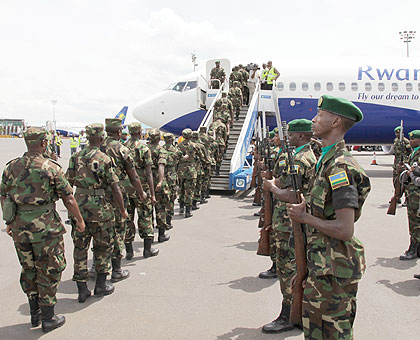Rwanda’s terrible experience of the 1994 Genocide against the Tutsi, is the main reason compelling the country’s armed forces to agree to help consolidate peace in the new nation of South Sudan.


Rwanda’s terrible experience of the 1994 Genocide against the Tutsi, is the main reason compelling the country’s armed forces to agree to help consolidate peace in the new nation of South Sudan.This was said, yesterday, by the Chief of Defence Staff of Rwanda Defence Forces, Lt Gen Charles Kayonga, at the departure of the initial 150 RDF peacekeepers to South Sudan.These are part of the 850-strong contingent that will be Rwanda’s contribution to the UN Mission in South Sudan (UNMISS).The new engagement comes as the RDF’s response to a UN Security Council request for peacekeeping troops in South Sudan, which seceded from the Republic of Sudan last year. They are going into South Sudan with a mission to help the new country consolidate peace as it rebuilds itself as a post conflict country."The reason the UN requested us to deploy in South Sudan is because of our good work and professionalism, which the UN knows. It is because of the experience and discipline we have shown in the about eight years we’ve been involved in peacekeeping duty,” said Kayonga. The eight years he was alluding to is the peace keeping mission in Darfur in Sudan where the country maintains a force of over 3200 troops."It means that they have a lot of expectations in us,” Lt. Gen. Kayonga told the troops.However, Kayonga noted that even as the country continues to commemorate the Genocide, the motivation for agreeing to deploy in UN peacekeeping missions, including UNMISS, "is not only about the UN commending our work.”"There are other reasons obliging us to join these missions. The main reason is enshrined in our constitution. Rwanda has to be ready to rescue and not to abandon those in need,” Kayonga said."We were abandoned in 1994, during this same period of commemoration. This is a historical day, we are not going to abandon others. I request you to serve humanity as you did in 1994 when you stopped the Genocide and liberated this country.”Emphasising the need and importance of fulfilling their peacekeeping duties by following orders and standing procedures of peacekeeping, he noted that even after the 1994 liberation war, they should not rest as the army continues in the struggle to build the country as well as its image in terms of diplomacy.Rwanda already has over 3,200 peacekeepers deployed in western Sudan’s region of Darfur under the AU/UN Peacekeeping mission in Darfur (UNAMID), even as it sets to deploy a total 850 peacekeepers under UNMISS.UNMISS was established on July 8, 2011 by UN Security Council Resolution 1996 (2011). South Sudan became independent on July 9, last year. Army and Defence Spokesperson, Col. Joseph Nzabamwita, also emphasised that the new deployment is significant to Rwanda as it comes at a time when Rwandans commemorate the 1994 Genocide against the Tutsi. Nzabamwita who re-assumed his office yesterday said that the "historic” deployment is important as Rwanda has vowed to keep the ‘Never Again’ pledge in and outside the country.According to Col. Nzabamwita, the contingent will find another 150-strong Rwandan force that travelled by land recently, through Uganda, with the entire force’s equipment, including vehicles and weaponry."Our forces are going to deploy in Equatoria state which has three states – eastern, western and central.”The Rwandan contingent will also be charged with protecting UN facilities at the UNMISS Headquarters in Juba.Col. Nzabamwita said the force is being deployed under chapter seven of the UN treaty which permits them to use force in self defence and when protecting civilians and UN facilities.South Sudan is divided into ten states which correspond to three historical regions of the Sudan: Bahr el Ghazal, Equatoria, and Greater Upper Nile.The Rwandan contingent will be deployed in Equatoria state which lies along the borders of Uganda, the Democratic Republic of Congo (DRC) and the Central African Republic (CAR).According to UNMISS website, the mission is supposed to have a least 7,000 troops, including 900 civilian police personnel. Kenya is among the other countries which will contribute to the multinational mission.


